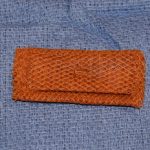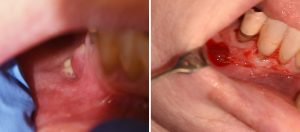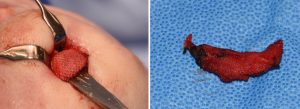Background: Chin augmentation has been done by a variety of materials over the years. Each biomaterial used has is own unique handling and tissue response characteristics. But fundamentally these materials come down to those with a smooth or non-smooth outer surface. Materials with a non-smooth surface are associated with varying degrees of tissue adherence and/or ingrowth.

The advantages of a mersilene chin implant is that its porous material allows for tissue ingrowth and adherence. Its cloth-like material surface avoids displacement once positioned because of a high frictional resistance. These material characteristics, however, do not make it resistant to the risk of long-term complications.


While not expected and completely misdiagnosed, the mesh chin implant eventually caused a tissue erosion that developed an exposure into the overlying intraoral vestibule. One may believe that tissue ingrowth prevents an erosive potential of an implant, or avoids an infection with material exposure, but this case illustrates that is not an accurate biologic expectation.
Case Highlights:
1) It is possible that chin implants can cause a long-term soft tissue problem through erosion.
2) A chin implant can cause intraoral symptoms that can be confused with a dental problem.
3) Mersilene facial implants can be successfully removed but they do not do so easily due to the tissue ingrowth.
Dr. Barry Eppley
Indianapolis, Indiana



